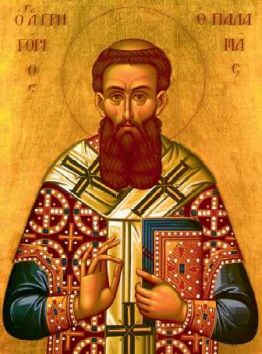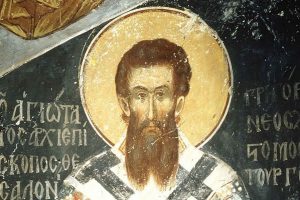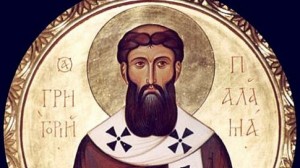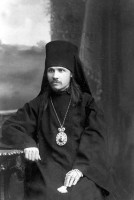 In the Name of the Father and of the Son and of the Holy Spirit. Amen.
In the Name of the Father and of the Son and of the Holy Spirit. Amen.
Glory to Jesus Christ!
On this the second Sunday of the Great Fast we celebrate the memory of St. Gregory Palamas.
This great saint of the Church was Archbishop of Thessalonica in Greece during the 14th century. Yet even though he was from an era long past, and from a place far away, like the commemoration of the restoration of the Holy Icons which we celebrated last week, the life and teaching of St. Gregory are as important for us today as ever.
If last week the Church put the icons before us as proof that God through Jesus Christ has restored man to the image and likeness from which he fell of old, this week the Church puts before us the teaching of how we ourselves can become icons of Christ, showing forth in our own lives what it means to be authentic human beings.
The life and contributions of St. Gregory Palamas are great and manifold. And while there is much of profit to be had throughout, let us focus today on one simple teaching which can help us rediscover for ourselves the image of Christ within us.
St. Gregory throughout his life, in all his varied occupations and roles – as a student, as a layman, as a monk, as a priest, as an abbot, and as a bishop – sought one thing, and one thing only, to live a life of prayer and stillness in God – a life in which no matter where he was, no matter what he was doing, he was always aware of the presence of God, Who dwelt within him by virtue of the gift of Baptism.
This was St. Gregory’s sole goal in life, to be still, as the Psalmist says and know that the Lord is God.
When the Fathers write about stillness and its necessity for living a healthy Christian life, they speak about it in primarily two ways: external stillness and internal stillness – the stillness of the body and the stillness of the soul. The one, if practiced properly, leading to the acquisition of the other, that is stillness in the external activity leading to and assisting in the development of internal stillness – a stillness of the soul standing continually in the presence of God.
In the lives of the Saints we see countless examples of how men and women fled from the busyness and bustle of the world in order to devote themselves to prayer and fasting in the stillness and quietness of the desert.
And, if we know the Scriptures, we know that this phenomenon was nothing new, for even in Old Testament times those who wished to draw near to God, understood the benefit of a retreat to the wilderness.
Did not Moses encounter God in the burning bush in the wilderness of Mount Sinai, and did not he converse with God and receive the Ten Commandments only after ascending this great mountain and leaving the world behind?
Did not the Hebrew people after they had crossed the Red Sea, spend forty years in the desert, purifying themselves and learning the ways of the Lord, before they could enter the Promised Land?
Did not the Prophet Elias, who dwelt for many years in a cave, sense the presence of God in the stillness of a light and gentle breeze rather than in the power of the mighty wind, the earthquake, or the fire?
Did not St. John the Baptist prepare himself for his ministry as the Lord’s Forerunner and Baptist through his ascetical struggle and angelic life in the Jordanian desert, wearing camel’s hair and a leathern belt and eating only locusts and wild honey?
And did not our Lord Himself spend forty days and forty nights in prayer and fasting in the wilderness before overcoming the devil and his temptations? And did not He, during His public ministry often times arise early in the morning and go to a private place to pray to His heavenly Father?
These few examples are more than enough to see that those who wished to serve the Lord, and even the Lord Himself, prepared themselves for their ministry by a period of prayer and fasting, and by a retreat from the world and a sojourn in the desert.
And of course, we who are engaged in the Great and Holy Fast find ourselves in this very tradition, for we ourselves are have made an attempt to retire from the busyness of the world – not by fleeing to the desert – but by creating an atmosphere of quietude and stillness in our homes and in our lives.
During these past two weeks, we’ve instituted numerous changes to our lifestyle so that we might acquire the spirit of stillness which the Great Fast offers to us.
We’ve not only restricted the amount and type of food we put into our mouths, but we’ve also carefully scrutinized every word which comes across our lips. We’ve limited or even entirely given up the television and radio in exchange for spiritual reading and prayer, or simply for a chance to sit in silence and think, or to go outside for a walk, or to help someone in need.
We’ve made an effort to be present at the weekly services of the Church where we receive not only strength and encouragement from one another in our joint struggles, but also real spiritual food and nourishment in the Body and Blood of Jesus Christ at the Presanctified Liturgy.
We’ve added to our morning and evening prayers, the Lenten Prayer of Saint Ephraim, in which we ask God to replace our vices with virtue, as we seek to see our own sins while not judging our brother.
And having turned our eyes from our brother’s sins to our own, we’ve begun to see the need for that great cleansing and renewing act of Confession.
And in all things we have sought to create the right environment for spiritual work and activity, so that we might be renewed after the image of Jesus Christ, Who Himself is the only true revelation of what it means to be a human being.
Now to be sure, the Lord sees how during these forty days we have voluntarily created and entered into our own personal deserts to pray and fast. And He knows that we have done this seeking nothing other than a passover into the Promised Land of our hearts, nothing other than a Paschal experience of our own resurrection.
And so today, the Lord meets us in this wilderness of Great Lent and gives us a most important teaching. He says to us, “If you wish to profit fully in this place of spiritual struggle, enter into the inner most chamber of your heart, and there seek Me for the Kingdom of God is within you.”
This is the very key to the Fast: to make the transition from outer stillness to inner stillness, from outer forms to inner realities – to experience not only a change in external lifestyle but also and more importantly an inner transformation and transfiguration of the heart.
This is the whole reason why we’ve created an environment conducive to stillness, reflection, and prayer, so that our time and energy which is normally spent on the world, can be redirected inward through self analysis and contrition, and then upward to God through prayer and repentance.
St. Gregory Palamas tells us that when a man looks inward into the depths of his heart he discovers there two things. First he discovers his own sinfulness, for as the Lord says, “out of the heart proceed evil thoughts, adulteries, murders, pride, foolishness, and the like.” And secondly, he discovers there the grace of God which was planted firmly and deeply long ago through the gift of Baptism.
And in this descent into the heart man experiences both sorrow and joy; sorrow for his sins and joy in the discovery of the Lord, Who despite his inner wretchedness has not withdrawn His grace.
This dual experience of sorrow and joy is what the Fathers refer to as the blessed state of joyful mourning. And it is this joyful mourning which gives birth to true and ardent prayer. The prayer which brings sweet tears of contrition which wash the soul of its former defilement and cleanse the man of his passions. For this prayer brings not only real warmth and love for God and neighbor, but the grace of God necessary to bring about man’s true renewal and regeneration.
And so, what is the message for us today, brothers and sisters?
The message is that through interior prayer the Lenten season can changed from a torturous period of external self-denial, in which we find ourselves more angry and irritable than ever, into a joyous period of inner self-transformation which leads to more healthy and fulfilling relationships with the Lord and each other.
Through interior prayer the desert of our hearts can blossom once again into Paradise, and we can experience Great Lent, no longer as a time which we dread each year, but as a time to which we even look forward to, as the creation itself after the coldness and darkness of winter looks forward each year to its springtime renewal and rebirth.
May the Lord Jesus Christ, grant us this great gift of interior prayer so that during the stillness and quietude of Great Lent we might discover with greater awareness His presence within us, and thereby experience that blessed state of joyful mourning through which we can once again recover the divine image and likeness in which we were created.
To our Lord Jesus Christ be the glory, together with His eternal Father, and His all-holy, good, and life-creating Spirit, now and ever and unto the ages of ages. Amen.
Glory to Jesus Christ!
















